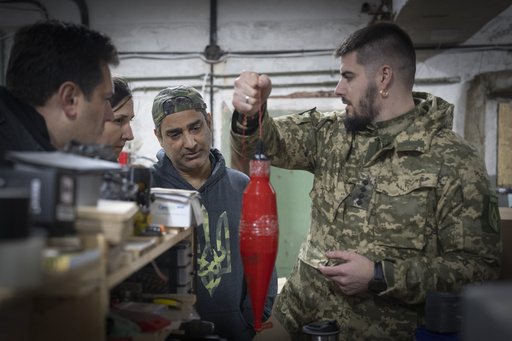
KHARKIV, Ukraine — Each time Amed Khan, a U.S. philanthropist, returns to Ukraine, he begins his visit by expressing sympathy for the lives lost due to the ongoing conflict. Over the last two and a half years, Khan’s organization has donated more than $50 million in support of both civilians and soldiers impacted by Russia’s invasion. Tragically, many of those the aid aims to assist are no longer alive.
Khan, who has transitioned from a government role to philanthropy, feels a familial connection with those he aids. He makes it a point to visit frontline areas and war-ravaged cities, aligning himself closely with the individuals affected by the turmoil. This personal involvement deeply exposes him to the suffering and losses they face. “When you’re involved with people directly, you feel the pain of war,” he remarked after meeting a father whose son had succumbed to a bombing.
As a voice among many across the U.S. political landscape, Khan expresses concern that the American government, which plays a key role in supporting Ukraine, hasn’t done enough to ensure its success against Russia. With the U.S. elections on the horizon, he remains skeptical of any significant change in policy. Khan reflects on the international support for Ukraine, claiming, “Since the war began, the United States managed to rally the allies to support Ukraine, but not in the way it should.” His perspective suggests that the current strategic approach may not lean towards achieving a definitive victory for Ukraine.
In comments made while in the eastern Kharkiv region, Khan points to the $59.5 billion in military aid provided by the U.S. since Russia’s invasion began in 2022, yet he notes that internal political dynamics within the U.S. seem to obstruct Ukraine’s potential. Promised weaponry often arrives tardily, according to Ukrainian officials. President Joe Biden’s administration has approached requests from Ukrainian President Volodymyr Zelensky, including aspirations to join NATO and utilize Western-supplied arms for attacks deeper into Russian territory, with caution due to concerns regarding escalation with a nuclear-capable Russia.
Political predictions suggest that Vice President Kamala Harris is likely to maintain a similar stance if she assumes office, while former President Donald Trump, the Republican candidate, has voiced criticism towards ongoing U.S. aid to Ukraine and may aim to further restrict military assistance, despite mentioning an unspecified strategy to rapidly end the conflict. Meanwhile, Russia has forged stronger ties with countries such as Iran and North Korea, which is reportedly dispatching troops to bolster its military efforts.
Another U.S. philanthropist, Howard G. Buffett, highlights the urgency, stating during his recent Ukraine visit that “If the war escalates, then we’re in it … and we’re not even providing Ukraine enough to win.” Buffett, a Republican and son of investment mogul Warren Buffett, focuses on humanitarian efforts in areas like infrastructure and agriculture, claiming his foundation has contributed around $800 million to Ukraine. He warned that if Ukraine fails, the democratic world would suffer significant repercussions.
This conviction has encouraged some Americans, like one volunteer who goes by the call sign “Smoky,” to travel to Poland to enlist in Ukraine’s international legion after a year of contemplation. A former accountant without military experience, Smoky now serves with a unit in eastern Kharkiv. As a father, he feels the emotional weight of witnessing the effects of the invasion on Ukrainian families. While the U.S. approaches the electoral season, Smoky finds relief from the domestic political drama, concentrating instead on preparing for his upcoming missions.
Dima, another volunteer from Texas, initially committed to three months of service in Ukraine in 2022, but that has expanded into a multi-year endeavor. The former Marine has endured some of the war’s fiercest confrontations, including the protracted battle in Bakhmut, taking his only break to visit family and friends, who could not relate to his experiences. He acknowledges the multitude of challenges America is currently facing, which may detract from the desire to send additional funds to support Ukraine, yet emphasizes the dire need for continued assistance.
Khan is currently overseeing around 300 ongoing projects in Ukraine and urges U.S. citizens to pay attention to the lives devastated by the conflict, underscoring that the war’s resolution carries gravity for global stability. He expressed hope that the forthcoming U.S. presidential winner would genuinely endeavor to grasp the realities in Ukraine and seek innovative solutions to forge a path toward peace.
